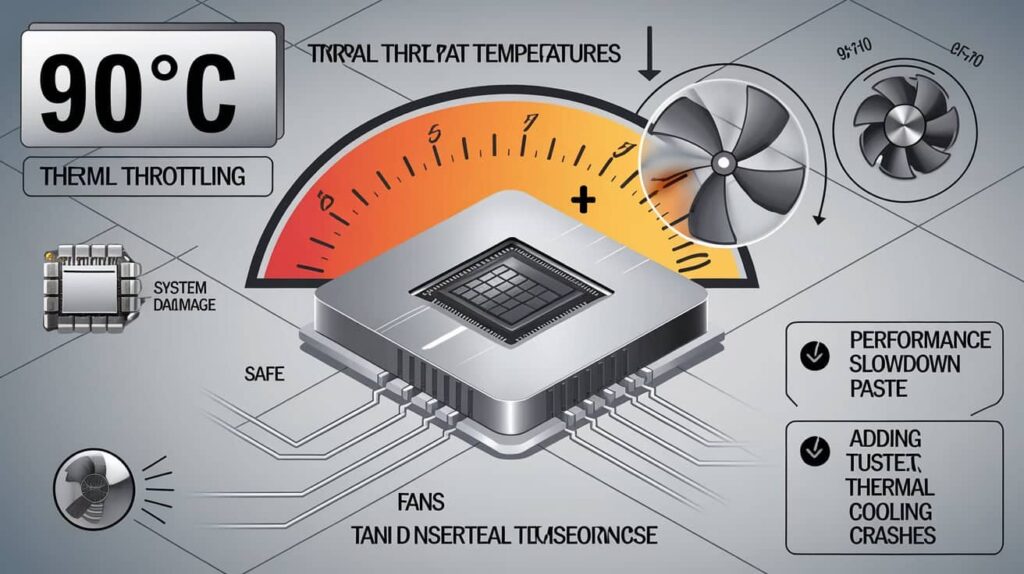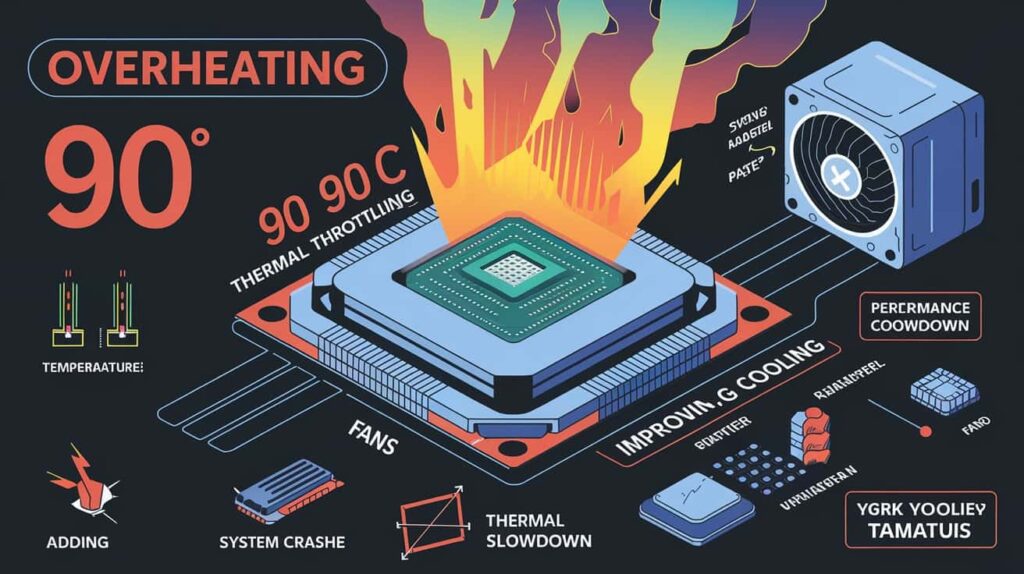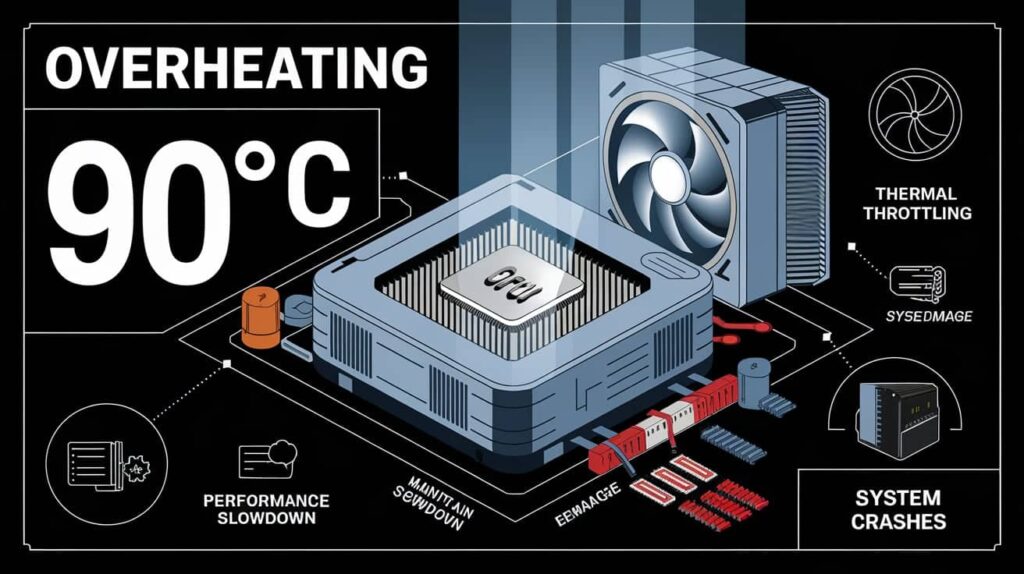Yes,Is 90 Degrees Celsius Hot for a CPU? based on my experience. My PC slowed down significantly, and I noticed frequent crashes during gaming. Upgrading the cooling system and cleaning the fans helped bring the temperature down and improved performance.
Yes, 90°C is hot for a CPU and can lead to thermal throttling or damage over time. Most CPUs perform best below 85°C during heavy tasks. Keeping the temperature lower ensures better performance and a longer lifespan.
Stay tuned with us as we dive into the topic, ‘Is 90 Degrees Celsius Hot for a CPU?’ Discover why it matters, what happens at this temperature, and how to keep your CPU cool!
Why Does CPU Temperature Matter?
High CPU temperatures can:
- Lower performance due to thermal throttling.
- Damage internal components over time.
- Cause system crashes and instability. Keeping your CPU cool ensures better performance and longer hardware life.
Read More: Is 100c Too Hot For Cpu – Here’s What You Need To
Understanding CPU Thermal Throttling and Damage

CPU thermal throttling happens when the processor reduces its speed to lower its temperature during overheating. This protects the CPU but reduces performance. Prolonged overheating can cause permanent damage to internal components, reducing the CPU\u2019s lifespan. Keeping your CPU cool prevents throttling and ensures smooth performance.
How to Keep CPU Temperature Low
- Apply high-quality thermal paste.
- Maintain proper airflow in your PC case.
- Clean dust from fans and vents regularly.
- Upgrade to a better cooling system if needed.
Is 90°C Too Hot for a CPU?
Yes, 90°C is too hot for most CPUs. It can cause thermal throttling, reducing performance, and may damage the CPU if sustained for long periods. Ideally, CPU temperatures should stay below 85°C during heavy use. Proper cooling and regular maintenance can help prevent overheating.
Factors That Influence CPU Temperature
- Workload: Demanding tasks generate more heat.
- Cooling system: Ineffective cooling raises temperatures.
- Room temperature: A warm environment increases CPU heat.
- Dust buildup: Blocks airflow and causes overheating.
Read More: How To See What Cpu Cooler I Have – Simple Guide To Fin
What Happens If a CPU Reaches 90°C?
When a CPU hits 90°C:
- It throttles performance to cool down.
- The system might shut down to protect hardware.
- Long-term exposure can damage the CPU.
How to Lower CPU Temperature Below 90°C

- Improve airflow by adding case fans.
- Use a high-performance CPU cooler.
- Replace old or poorly applied thermal paste.
- Adjust CPU voltage or clock speed in BIOS.
- Place your PC in a cool, ventilated area.
Signs Your CPU Is Overheating
- Frequent crashes or blue screens.
- Loud fan noise.
- Slow performance during demanding tasks.
- Temperatures consistently above 85°C.
Best CPU Cooling Solutions for Optimal Performance
- Air coolers: Budget-friendly and effective.
- Liquid cooling systems: Best for high-performance setups.
- Thermal paste: Helps with heat transfer.
- Custom cooling setups: For advanced users.
When to Seek Professional Help for Overheating CPUs
Consult a professional if:
- CPU temperatures exceed 90°C despite troubleshooting.
- Cooling components need replacement or upgrades.
- You are unsure how to apply thermal paste or change BIOS settings.
Is 90°C Safe for a CPU While Gaming?
No, 90°C is not safe for a CPU while gaming. Prolonged gaming at this temperature can cause thermal throttling, reduce performance, and potentially damage the CPU. Most gaming CPUs should stay below 85°C for optimal performance. Upgrading cooling or lowering graphics settings can help reduce the temperature.
How Hot is Too Hot for a CPU?
Temperatures above 90°C are generally too hot for most CPUs. Prolonged exposure can cause thermal throttling, reduced performance, and long-term damage. Ideally, CPUs should stay under 85°C during heavy tasks. Keeping the temperature low ensures better performance and hardware longevity.
Is 90 Degrees Celsius Hot for a CPU Laptop?
Yes, 90°C is very hot for a laptop CPU and can cause performance issues or long-term damage. Laptops have limited cooling systems, making them more prone to overheating. Prolonged use at this temperature can shorten the CPU’s lifespan. Cleaning vents, using a cooling pad, and optimizing settings can help lower the temperature.
Read More: What Games Are Cpu Intensive – Full List Revealed!
Is 90 Degrees Celsius Hot for a CPU on Windows?
Yes, 90°C is quite hot for a CPU. Most CPUs should stay under 80°C for optimal performance. At 90°C, it may cause thermal throttling or damage over time. Consider improving cooling if temperatures are consistently this high.
Is 100 Degrees Celsius Hot for a CPU?

Yes, 100°C is very hot for a CPU. Most CPUs should stay below 85°C for safe performance. At 100°C, the CPU may overheat, leading to throttling or damage. It’s important to cool it down immediately.
Post Navigation
Explore related topics:
- Best cooling solutions for CPUs.
- Signs of failing thermal paste.
- Tips for improving PC airflow.
FAQs:
1.What is the safe temperature range for a CPU?
The safe temperature range for a CPU is typically between 30°C and 85°C. Running above 85°C may cause overheating. Prolonged exposure to high temperatures can damage the CPU and affect its performance.
2. Can a CPU survive 100°C?
A CPU can briefly survive 100°C, but it is not ideal for long periods. Extended exposure to such high temperatures can cause damage and reduce the CPU’s lifespan. It’s important to cool it down quickly to prevent overheating.
3. How can I cool down my CPU?
To cool down your CPU, ensure proper airflow by adding more fans to your PC case. You can also upgrade to a better CPU cooler, such as a liquid cooler or high-performance air cooler. Cleaning dust from your system regularly helps maintain cooling efficiency.
4. What happens if the CPU gets too hot?
If the CPU gets too hot, it may throttle its speed to reduce temperature, causing slower performance. Prolonged overheating can lead to system crashes or permanent damage. It’s important to address overheating issues promptly.
5. Should I worry if my CPU temperature hits 90°C?
Yes, 90°C is considered high for a CPU. Prolonged exposure to such temperatures can cause damage and impact performance. It’s recommended to improve cooling to lower the temperature.
Conclusion:
A CPU temperature of 90°C is definitely concerning and should not be ignored. While CPUs can tolerate high temperatures briefly, consistent exposure to such heat can lead to thermal throttling, reduced performance, and potential long-term damage. To ensure the longevity of your CPU, it’s crucial to invest in better cooling solutions, such as upgraded fans or liquid cooling systems.
Regularly monitor temperatures to keep them within safe limits, ideally below 85°C. Taking action early can prevent costly hardware issues in the future.
